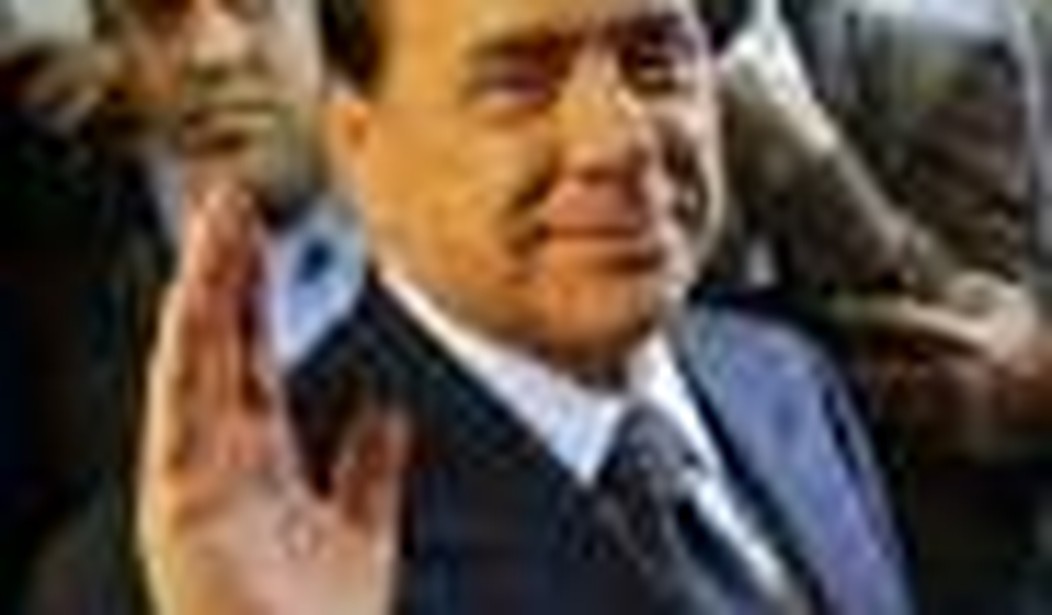Silvio Berlusconi has won a third term as Italy’s prime minister with an unexpectedly landslide victory. People of Freedom and its two allies have gained a 9-point lead over rival Walter Veltroni. It won 47 percent of the vote, which ensures them an overall seat majority both in the Chamber of Deputies and in the Senate. It was a great demonstration of strength and political vitality by the 71-year-old Berlusconi. The merger between Forza Italia and the National Alliance — which Mr. Berlusconi heftily achieved right before the vote — did much better than the Democratic Party, born after several years of efforts between Ds (Democrats on the Left, led by Piero Fassino, Massimo D’Alema, and Veltroni himself) and the left-of-center Margherita Party (led by Francesco Rutelli).
Votes seem to have slid from the left to the right. The Democratic Party led by Mr. Veltroni won 33.5 percent of the vote and his only ally, ex-public prosecutor Antonio Di Pietro, won 4.5 percent. The Marxist-Green alliance, the most anti-modern and “veto player” party, is surprisingly out of the parliament. Its percentage collapsed to 3.8 percent from 6.8 in 2006 (to win seats in the Chamber of Deputies and the Senate, 4% and 8% are needed, respectively). Many of its supporters might have deserted the poll, but a lot of its constituents have been captured by the Democratic Party, by Di Pietro’s Party, and by more extremist, fringe Marxist parties on its left. It will be a parliament without communists in a country where the strongest Communist Party among Western countries once lived. Thanks to Mr. Veltroni.
At 80%, the final turnout appears to have been lower (-3.5%) than in the 2006 election. It was also the sharp simplification that Italians were waiting for. They have chosen a two-party system. People have punished parties that fueled system instability. In the new parliament only three parties will sit in the Senate and four parties in the Chamber of Deputies. But People of Freedom and the Democratic Party hold together 72 percent of the popular vote.
Mr. Berlusconi is conscious this will be his last opportunity to set Italy on its feet and to demonstrate that he is able to translate promises into action. He might rapidly form a cabinet with only twelve ministers, picked out for their specific abilities. Giulio Tremonti will be finance minister and Franco Frattini might be foreign affairs minister. The first hundred days will set the tone for Berlusconi’s five-year term. He promised the abolition of taxes on first houses, overtime pay, and cars — and, finally, he promised income tax cuts. But he should cover tax reductions with drastic cuts in public spending. He should cut down the waste and the privilege in public administration, make bureaucracy less onerous and civil jurisdiction more effective, and reform the welfare state, the pension system, and education. Also, he should address Italy’s energy dependence. Italian foreign policy is likely to change significantly too. Berlusconi’s Italy will be a closer friend of U.S. and Israel than Prodi’s.
Battle for change will be very hard. Berlusconi’s cabinet will face strong opposition from trade unions, many lobbies, and all sorts of particular interests groups. But if Mr. Berlusconi doesn’t tackle this struggle immediately after his landslide victory, he will unlikely succeed.
In his governmental activity Mr. Berlusconi will probably be influenced by the Northern League, which has approximately doubled its seats in the Senate (to 25 from 12). But Mr. Berlusconi and his allies will likely be tight compared with the 2001-2006 coalition, because their old and warring ally, Pierferdinando Casini, won’t take part in the government. What voters expect from them is no more fighting, no more “veto player”, no more excuses, no more delays in deciding what Italy needs.
On the left, Mr. Veltroni couldn’t escape the burden of Mr. Prodi’s outgoing center-left government — both its failure and its unpopularity. However, his result was disappointing by itself. He was able to drain votes from the Marxist-Green alliance, but he couldn’t break through and get support of the northern and non-partisan voters: his political record and his outlook during the campaign seemed to be not fresh enough, not sufficiently modern and free-market oriented. The “industrious class” of the north — entrepreneurs and workers — doesn’t rely upon the economic performance of the center-left reformists. The Northern League success is not to be considered a threat for Italian territorial integrity or democracy. It’s a complaint against big government and centralism. More and more hard-working people detest the ineffective and intellectualist politics of the leftist parties.
Now Mr. Veltroni must cross the desert of a five-year opposition in order to build the identity of his party and regain credibility. Democrats ought to learn from their defeat and reinvent themselves. Going back to intense fights among factions for leadership would be a big mistake.
The Democratic Party must be ready to agree with Mr. Berlusconi on an actual institutional reform in order to make parliamentary and governmental mechanisms more effective. Mr. Berlusconi has just called for a summit. Democrats have to provide their party with new political language and culture, which they need to come back into power. They also have to commit themselves to an open-minded and thoughtful opposition, by avoiding the temptation to conform with conservative and regressive demands by the trade unions and the communist left. Rather, they have to urge Prime Minister Berlusconi to accomplish bolder reforms and more changes. If hate against the political enemy prevails, there will be a new strategic failure of the reformist left. If Mr. Veltroni will be reliable as a “rupture” leader, he will build a new left on today’s ruins.
Federico Punzi is a journalist and a blogger. He is co-author of “Speciale Commissioni,” a “Radio Radicale” program about Italian parliamentary committees’ activity. He writes about Italian and international politics for newspapers and web magazines.









Join the conversation as a VIP Member